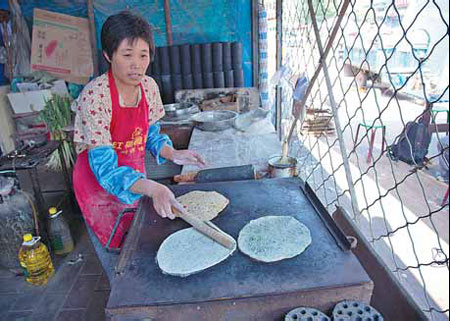Grains of wrath as drought hits hard
Updated: 2012-08-30 07:25
By He Na (China Daily)
|
||||||||
|
A cook in a small roadside restaurant in Sanhe, Hebei province, makes a traditional Hebei dish. Droughts have affected some of the world's largest grain-producing countries, leading to a decline in output and a rise in the price of cereal crops. China has so far managed to maintain steady cereal food prices as a result of its large volume of reserves, drawn from bumper harvests over recent years. D.J.Clark / for China Daily |
"The price of domestic oils have risen twice since the beginning of the year. Peanut oil has risen by more than 10 percent and other oils have also registered rises, although less drastic."
"Luhua" brand peanut oil currently costs 143 yuan per 5 liters, but in early July it was 132 yuan, and in January it was around 100, he said.
International connections
Li Guofen, a farmer in Jixi, Heilongjiang province, may not care about or even have heard of Brownsburg in the US state of Indiana, she just wishes that she had more hands on board to help tackle the worms afflicting her cornfield. However, farmers in Brownsburg are also concerned about their yields as the drought withers their corn and soybean seedlings.
But these farmers, separated by thousands of kilometers, are jointly affecting the world grain price.
"China's increasing connection with the world means that fluctuations in the global grain price will inevitably affect our domestic market, especially as the volume of China's cereal imports keeps increasing," said Li Guoxiang, a researcher at the rural development institute of the Chinese Academy of Social Sciences.
International grain prices have soared since June and the price of corn has risen by a staggering 50 percent. The prices of soybeans and wheat also rose by about 30 percent, according to the People's Daily newspaper.
In Shandong province, the price of imported soybeans was 3,700 yuan per metric ton at the start of the year. By May that figure had risen to 4,200 yuan and on Aug 1 it soared to 4,700 yuan. The corn price is surging as well.
"As the world's largest grain exporter, the decline in US output will greatly affect countries that rely on grain imports. China will not be exempt, but the impact will be very limited," said Li from CASS. "So far, the majority of our cereal crop volumes are better than last year and another bumper harvest is expected."
Droughts in the US and Russia have resulted in a surge in the prices of major cereals, said Xie Jianmin, deputy director-general of the international cooperation department at the Ministry of Agriculture, but he added that the situation is not as serious as in 2007-08, when a global food crisis forced millions into food poverty. Meanwhile, China National Radio suggested that speculation can't be ruled out as a factor in the price rises.
"China's long-standing self-sufficiency in cereals after eight consecutive years of record harvests and the large volumes in storage guarantee that the impact will be slight," said Li. But he also warned that the country's reliance on soybean imports could be a cause for concern, because 30 to 40 percent of soybean imports come from US.
Chen Xiwen, director of the leading group on rural work at the Communist Party of China's Central Committee, predicted that soybean output in China will be roughly 13 million metric tons this year, while imports will amount to 55 million. The import volume was 52.64 million metric tons in 2011, and 54.8 million the year before. Meanwhile, China's soybean self-sufficiency rate has now fallen below 20 percent.
Soybeans to corn powder
General food prices rose in each of the five consecutive weeks running up to Aug 13 to 19, according to the commerce ministry. The price of eggs rose by 1.3 percent from the previous week, pork was up by 0.6 percent, and the prices of cereals and oils also rose.
Xinhua News Agency's monitoring system for domestic food prices shows that the price of eggs has risen rapidly since late July. By Aug 25, the price had risen by 15 percent from July 20, and currently exceeds 10 yuan per kg in more than 60 percent of provinces and cities. Prices in other areas are more than 9.4 yuan per kg on average.

 Relief reaches isolated village
Relief reaches isolated village
 Rainfall poses new threats to quake-hit region
Rainfall poses new threats to quake-hit region
 Funerals begin for Boston bombing victims
Funerals begin for Boston bombing victims
 Quake takeaway from China's Air Force
Quake takeaway from China's Air Force
 Obama celebrates young inventors at science fair
Obama celebrates young inventors at science fair
 Earth Day marked around the world
Earth Day marked around the world
 Volunteer team helping students find sense of normalcy
Volunteer team helping students find sense of normalcy
 Ethnic groups quick to join rescue efforts
Ethnic groups quick to join rescue efforts
Most Viewed
Editor's Picks

|

|

|

|

|

|
Today's Top News
Health new priority for quake zone
Xi meets US top military officer
Japan's boats driven out of Diaoyu
China mulls online shopping legislation
Bird flu death toll rises to 22
Putin appoints new ambassador to China
Japanese ships blocked from Diaoyu Islands
Inspired by Guan, more Chinese pick up golf
US Weekly

|

|







